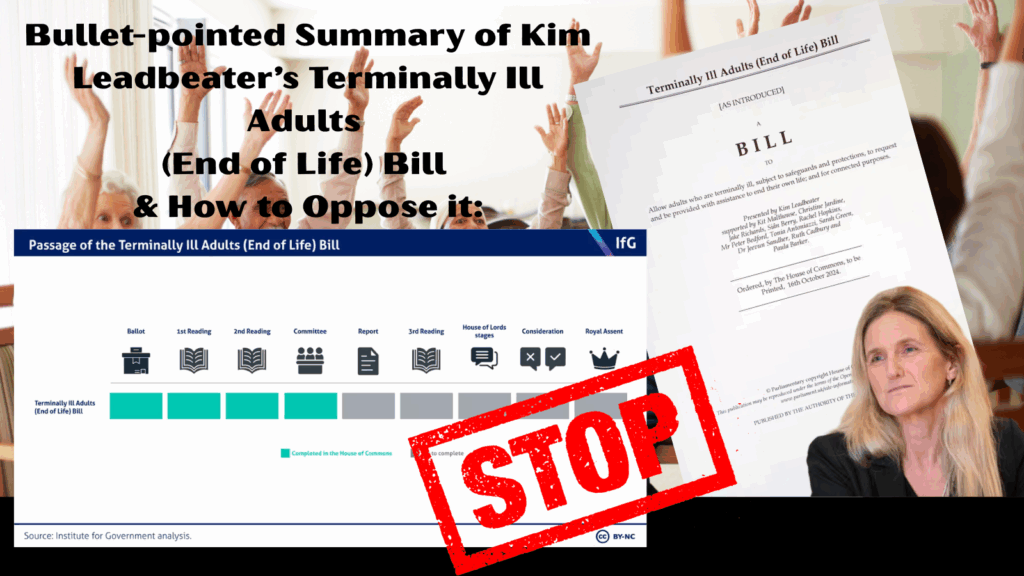
Here’s an easy-to-read, bullet-pointed summary of Kim Leadbeater’s Terminally Ill Adults (End of Life) Bill, introduced as a Private Member’s Bill in October 2024. The summary covers the bill’s background, progress, flaws, and strategies to oppose it:
Introduction of the Bill (October 16, 2024):
- Kim Leadbeater, Labour MP for Spen Valley, introduced the bill after topping the Private Member’s Bill ballot, giving her priority to propose legislation.
- She was offered various bill topics (e.g., abuse in sports) but chose assisted dying, aiming to legalise it for terminally ill adults in England and Wales with safeguards.
Challenges as a Private Member’s Bill:
- Private Member’s Bills have less parliamentary time than government bills, making passage difficult due to limited debate slots (typically 13 Fridays per session).
- Despite this, Prime Minister Keir Starmer supports the bill and promised a vote to campaigner Dame Esther Rantzen, increasing its visibility.
Neutral MPs’ Involvement:
- Two MPs, expected to remain neutral as procedural safeguards (likely Speaker’s office or committee chairs), voted in favour, raising concerns about impartiality.
- This is not explicitly detailed in sources but aligns with criticisms of the process’s fairness.
Second Reading (November 29, 2024):
- The bill’s first debate occurred, passing with a 330–275 vote, a 55-vote majority, allowing it to proceed to Committee Stage.
- MPs could express doubts but not amend the text; some supported it in principle, expecting stronger safeguards later, which may now make them reconsider.
- The majority was modest, influenced by new MPs’ inexperience with Private Member’s Bills and emotive rhetoric, while seasoned MPs noted the rushed process.
Committee Stage (February–March 2025):
- A 23-MP committee (14 supporters, 9 opponents) scrutinized the bill, ending March 28, 2025.
- Over 500 amendments were proposed; only ~150 were accepted, with just 18% from opponents, raising bias concerns.
- Key changes included replacing High Court judge approval with a panel (lawyer, psychiatrist, social worker) and allowing doctors to initiate assisted dying discussions.
- Critics, including MP Danny Kruger, argued the process favoured pro-bill voices, initially excluding disability groups and featuring only pro-assisted dying overseas witnesses.
Report Stage and Third Reading:
- Scheduled for April 25, 2025 (postponed from earlier due to amendment complexity), where MPs can propose further amendments, grouped by the Speaker for debate.
- The Third Reading vote follows; if passed, the bill goes to the House of Lords, where it faces additional scrutiny, amendments, or rejection.
- Debate may extend beyond one day, potentially until June 13, 2025, though May 16 is also mentioned as a target.
Opposition Strategy:
- Campaigners urge sending “save the date” postcards to MPs post-Easter to lobby against the bill, needing just 28 MPs to switch votes (from 330 to 275) to defeat it.
- Visiting MPs in person is recommended as more effective than letters; local hospices can also be contacted to highlight funding concerns.
Terminology Concerns:
- Critics dislike the term “assisted suicide,” but the bill uses it, despite attempts to reframe it as “assisted dying” or “shortening death.”
- The bill allows terminally ill adults with a “clear, settled, and informed wish” to end their lives, subject to safeguards.
Flaws in the Bill:
- Eligibility Criteria: Defines “terminal illness” as death within 6 months, but prognosis is often inaccurate (20% misdiagnosis rate). Conditions like diabetes (if insulin is refused) or anorexia could qualify, as seen in U.S./Canadian MAID cases.
- Safeguard Weaknesses: Two doctors must approve, but the first can select a second, potentially bypassing dissent. Doctors can initiate discussions, risking coercion.
- Mental Health Risks: Depression may be mistaken for a wish to die; over 40% of U.S. MAID cases cited feeling like a burden, sometimes seen as valid by doctors.
- Judicial Oversight Removed: High Court judge replaced by a self-selecting panel, criticized as less impartial and rigorous.
- Legal Precedents: Safeguards often weaken post-legalization (e.g., Canada removed 6-month limits in 2021 via court challenge). ECHR rights could undermine restrictions, potentially allowing non-voluntary euthanasia.
Criticism of Committee Process:
- Selection favoured pro-bill MPs; initial private sessions excluded key groups like the Royal College of Psychiatrists and disability organisations, only later included after backlash.
- All eight overseas witnesses supported assisted dying, none from Canada or the Netherlands, where controversies exist.
- Over 100 safeguard amendments (e.g., eating disorders, hospice opt-outs, mental health checks) were rejected, and the NHS charter was amended to allow lethal drugs.
Public and Media Sentiment:
- Many MPs and media outlets (except The Express, consistently pro-bill) oppose it, citing weakened safeguards and a chaotic process.
- Posts on X highlight growing opposition, with MPs like Gregory Stafford and media calling the bill “irredeemably flawed.”
Implementation Timeline:
- If passed, the bill mandates a 4-year implementation period (until 2029), extending the original 2-year delay, to develop regulations and NHS policies.
- Opponents aim to defeat it before this stage to avoid entrenchment.
Broader Concerns:
- Groups like “My Death, My Decision” criticise the bill’s narrow scope (terminal illness only), advocating for broader eligibility, which opponents fear could expand post-legalisation.
- MP Tom Gordon suggested extending the prognosis to 12 months for neurodegenerative diseases, raising ethical concerns about valuing some lives less.
What You Can Do:
- Lobby MPs in Person: Visit your MP during parliamentary recesses (e.g., post-Easter 2025) when they’re more available locally. In-person discussions are more impactful than letters.
- Send Postcards: Distribute “save the date” postcards to MPs after Easter to urge them to vote against the bill on April 25, 2025. Only 28 MPs need to switch votes to defeat it (from 330 to 275).
- Write to Local Hospices: Express concerns about the bill’s impact on hospice funding and care, as it may pressure them to offer assisted dying, potentially affecting donations. Highlight ethical and financial risks to encourage their opposition.
- Raise Awareness: Share resources like Liz Carr’s documentary playlist to highlight risks seen in other countries: Use social media (e.g., X) to amplify opposition, referencing critiques like SPUC on Panels.
- Contact Your MP in Writing: If in-person visits aren’t possible, write personalized letters outlining concerns (e.g., weakened safeguards, coercion risks). Find your MP’s contact details: UK Parliament Find Your MP.
- Stay Informed: Monitor the bill’s progress and upcoming debates (April 25–June 13, 2025) via to time your actions effectively.
For updates, check:
https://bills.parliament.uk/bills/3774/publications
References & Useful Links:
- Terminally Ill Adults (End of Life) Bill: call for evidence 6 January 2025 https://www.parliament.uk/business/news/2025/january/terminally-ill-adults-end-of-life-bill-call-for-evidence/
- Terminally Ill Adults (End of Life) Bill Volume 757: debated on Friday 29 November 2024 https://hansard.parliament.uk/commons/2024-11-29/debates/796D6D96-3FCB-4B39-BD89-67B2B61086E6/TerminallyIllAdults(EndOfLife)Bill
- Source: England and Wales assisted dying bill formally launched in House of Commons The Guardian, October 16, 2024
- Source: General procedural concerns in https://www.hansardsociety.org.uk/publications/guides
- The assisted suicide bill should not survive Dan Hitchens https://www.spectator.co.uk/article/the-assisted-suicide-bill-should-not-survive/ see https://archive.ph/7bOOa
- Ask your MP to vote no to assisted suicide at Third Reading https://righttolife.org.uk/asvote
- If you share these concerns, make your voice heard and don’t be ignored. Write or email your MP to express your views on the Assisted Dying Bill. You can find your MP’s contact details at https://members.parliament.uk/FindYourMP, and an email template is available from TOBI UK . Let your representatives know that proper safeguards must be in place to protect the most vulnerable in our society. They cant ignore us if we combine our voices! https://tupatriots.org/assisted-dying-bill-a-trojan-horse-for-a-dangerous-agenda
- Use this guide for effective lobbying: SPUC Lobbying Guide.
- Order postcards here: SPUC Postcards.
- Assisted suicide could be voted on before Christmas as Labour MP launches bill [Right To Life UK]: https://righttolife.org.uk/news/assisted-suicide-could-be-voted-on-before-christmas-as-labour-mp-launches-bill…
- Keir Starmer’s ‘strings were pulled by puppet master Lord Alli on assisted dying vote’ [Mail]: https://dailymail.co.uk/news/article-13928779/Keir-Starmers-Lord-Alli-assisted-dying.html…
- MPs accused of trying to lead Parliament down a ‘slippery slope’ amid calls to widen proposed help-to-die law [Mail]: https://dailymail.co.uk/news/article-13931063/mps-assisted-dying-law-labour-party-private-members-bill.html…
- Letby and Shipman murders show NHS workers ‘cannot be trusted on assisted dying’ [Telegraph (£)]: https://archive.ph/wjfnK
- What have Labour cabinet ministers said about assisted dying? [Guardian]: https://theguardian.com/society/2024/oct/04/what-have-labour-cabinet-ministers-said-about-assisted-dying…
- Hugely divisive vote to legalise assisted dying ‘could be held within weeks’ after Prime Minister backed plans to fast-track it through the Commons [Mail]: https://dailymail.co.uk/news/article-13851049/divisive-vote-legalise-assisted-dying-Prime-Minister.html…
- Robert Jenrick calls on Labour to block assisted dying bill [Telegraph (£)]: https://archive.ph/D2YK9
- Church leaders in UK call for ‘no’ vote on assisted dying bill [Catholic News Agency]: https://catholicnewsagency.com/news/259641/church-leaders-in-uk-call-for-no-vote-on-assisted-dying-bill…
- Lauren Smith: Assisted-suicide campaigners do not hold the moral high ground [Spiked]: https://spiked-online.com/2024/10/04/assisted-suicide-campaigners-do-not-hold-the-moral-high-ground/…
- Ian Birrell: Assisted dying would hurl a grenade at the floundering NHS [iNews (£)]: https://archive.ph/mPWMq
- William Atkinson: Labour MPs should listen to the Health Minister on assisted dying [Conservative Home]: https://conservativehome.com/2024/10/04/labour-mps-should-listen-to-streeting-on-assisted-dying/…
- Iain Macwhirter]: Why I now fear the slippery slope of assisted dying [Times (£)]: https://archive.ph/3arvi
- Dame Meg Hillier: We all want to have a ‘good death’ – but assisted suicide is not the solution [The Sun]: https://thesun.co.uk/news/30886786/assisted-suicide-dame-meg-hillier/…
- The Times view on assisted dying legislation: Unintended Consequences [Times (£)]: https://archive.ph/fQeyP
- Daily Mail Comment: Perils of rushing to assisted suicide law [Mail]: https://dailymail.co.uk/debate/article-13926793/DAILY-MAIL-COMMENT-Perils-rushing-assisted-suicide-law.html…
- Better End of Life Report 2024 [Marie Curie]: https://mariecurie.org.uk/policy/better-end-life-report… Hospice sector facing collective deficit of £77m [Hospice UK]: https://hospiceuk.org/latest-from-hospice-uk/hospice-sector-facing-collective-deficit-ps77m…
- 65% of adults are worried about access to palliative care [King’s College London]: https://kcl.ac.uk/news/65-of-adults-are-worried-about-access-to-palliative-care…
- The Problems With Canada’s Medical Assistance in Dying Policy By Jeremy Appel https://jacobin.com/2023/01/canada-medically-assisted-dying-poverty-disability-eugenics-euthanasia…
- The cruelty of Canada’s euthanasia policy Maid has been turned into a political weapon https://unherd.com/2023/08/the-cruelty-of-canadas-euthanasia-policy-maid/
- Terminally Ill Adults (End of Life) Bill 2024: A medical and ethical perspective https://www.johnwyatt.com/leadbeaterbill/
- https://www.instituteforgovernment.org.uk/explainer/kim-leadbeaters-assisted-dying-bill
- Sources: Liz Carr’s documentary https://www.bbc.co.uk/iplayer/episode/m001z8wc/better-off-dead
- YouTube Playlist :
